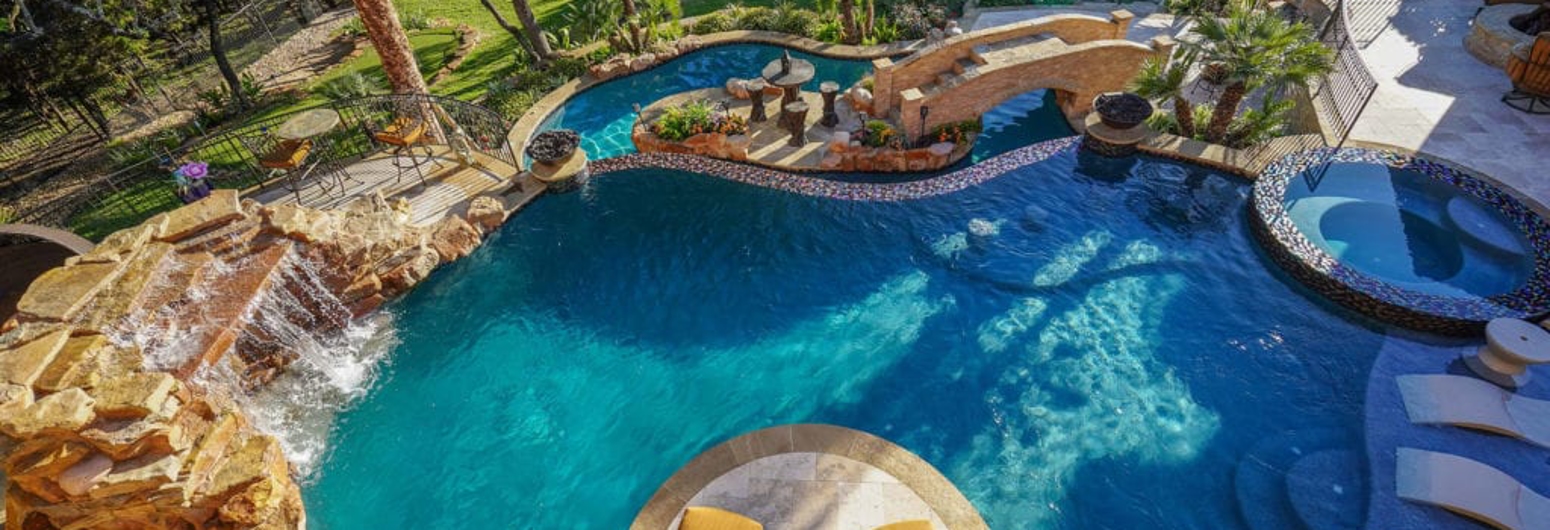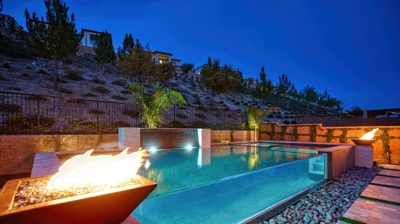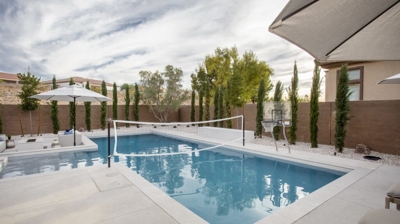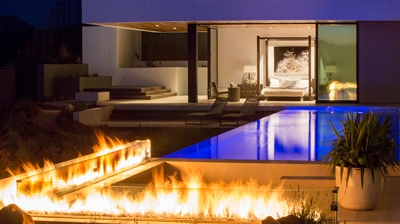Fiberglass vs. Concrete Pools
Whether you want an infinity-edge pool or a lap pool, using high-quality materials is the only way to ensure your pool will last for years to come. When homeowners decide to install a swimming pool, most people inevitably weigh fiberglass vs. concrete pools.
We want to dispel some myths and give you the facts. We will evaluate all the aspects of these pools, from their installation costs to durability. You’ll also get to know about customization and the interior surface texture, amongst other things.
The following is a breakdown of the aspects covered in our discussion of fiberglass vs. concrete pools. The next paragraphs explain each of them in detail.
- Cost
- Installation time
- Durability
- Customization
- Interior surface texture
- Manual maintenance
- Chemicals and electrical energy
- Heat
- Resale value
- Aesthetic value
Related: Swimming Pool Features to Consider During Installation or Remodel
1. Fiberglass vs. Concrete Pools: Installation and Maintenance Cost
Fiberglass Pools
A fiberglass pool is manufactured and transferred directly to your property for installation.
According to Home Advisor, the professional manufacture and installation of a standard fiberglass pool will cost you roughly $45,000 to $75,000. These prices depend on the shape, location, size, and type of your pool. Some pools, such as an infinity pool, cost more to construct than other regular pools since they may need extra fancy accessories, landscaping, and water features.
After construction, you can expect to spend around $400 annually on chemicals to keep the water and surface clean and for a pump and heater.
Concrete Pools
An in-ground concrete pool is built on site as it is installed, layer by layer, and will cost you between $50,000 and $90,000. The cost will depend on the size, shape, and type of concrete material you choose, with gunite being the most expensive and cast in place the cheapest.
This cost estimate includes several charges such as site preparation and excavation, interior finishing supplies such as paint and sealant, pump and tubing, and a lamp and ladders.
However, you will incur extra costs for additional labor, a water heating system, a perimeter walkway, and a vinyl pool cover. All this could cost you another $25,000.
After construction, pool maintenance will be somewhat more costly due to the additional chemical and electricity needs of a concrete pool.
2. Fiberglass vs. Concrete Pools: Installation Time
Installing an in-ground pool is a complex task that requires the service of a professional pool company. Both types of pools are in-ground, but how they are installed is the main difference between fiberglass vs. concrete pools.
Fiberglass
Fiberglass pools are relatively easier to install since they are delivered as pre-cast on site and installed as whole pieces. After installation, you’ll need to wait only two days before you can swim. The pool will also require a patio and decking. This will take an additional one or two weeks, meaning it takes between 3 – 5 weeks for the whole installation process.
Concrete
Concrete pools are more difficult to install and require more time for completion since they need reinforcing bars, mesh, and formwork constructed within a large dug hole. The installation involves technical processes that take 6 to 10 weeks.
3. Fiberglass vs. Concrete Pools: Durability
Fiberglass
Fiberglass pools come with a durable gel coat finish on a robust structure. In such pools, silkier water is ideal. If you want to have low maintenance, consider using a salt-chlorine generator. The reason is that salt is less harmful to the fiberglass shell.
Concrete
With a concrete pool, you rest assured of guaranteed durability. The pool has rigid interior finishes, including basic plaster. Such qualities protect it from damage caused by toys, dogs, or tree branches. But this doesn’t mean you avoid re-plastering and replacing the waterline tile every 10 to 15 years.
Unlike fiberglass, using a salt-chlorine generator (salt-water pool chlorinator) may have a negative effect in concrete pools. The reason is that the dissolved salt will end up damaging the plaster-based interior finish, although it won’t affect the tile finish.
Related: Deck Resurfacing. DIY or Hire?
4. Fiberglass vs. Concrete Pools: Customization
Fiberglass
Fiberglass pools are manufactured off-site then transported to the construction site. This means you can only choose from available prefabricated sizes and shapes. Most of them can reach up to 16 feet wide, 40 feet long, and 8.5 feet deep in size.
Concrete
The best part about a concrete pool is you are basically unlimited in the design of your pool. Depending on your space, you can have a pool in any shape or size, even customizing it to the shape of your yard or to avoid mature trees.
5. Fiberglass vs. Concrete Pools: Interior Surface Texture
Fiberglass
Fiberglass pools have a smooth surface with the feel of a bathtub. The pool is also non-porous, helping to inhibit bacterial growth.
For safety purposes, it’s worth noting that these pools’ surfaces may become slippery when wet; their built-in staircases and other features could cause falls or slips. Some pools come with an anti-slip texture which is still not that rough.
Concrete
Today, concrete pools have various surface types you can choose from, each with a different feel and cost. The more traditional surfaces can be relatively rough compared with fiberglass. And because they are more porous, they need a chemical sealant to prevent moisture absorption. But, there are many more surface types.
Plaster, sandstone, pebbles, quartz, and polished marble are among the options. Work with an experienced pool builder who knows which types are best for your pool depth, size and desired temperature.
6. Fiberglass vs. Concrete Pools: Manual Maintenance
Fiberglass
These pools need minimal maintenance and can easily be kept clean throughout the week. Since they have a smooth surface, it is easy to control the growth of algae and bacteria in them compared to their concrete counterparts, which may have these microorganisms stuck in their rougher surfaces.
Fiberglass pools also need less chemical treatment. Their coating does not affect the water’s pH; hence you do not need to frequently add acid to balance it. These collectively make the pools more maintenance-free.
Concrete
A concrete pool requires frequent maintenance. You will have to carry out a weekly cleaning and scrubbing and balance chemicals often. After every 10 to 15 years, some concrete pools will need resurfacing to prevent moisture and maintain their texture, but it depends on the surface type. Your pool installer will help you choose a low-maintenance surface type to minimize costs and effort.
7. Fiberglass vs. Concrete Pools: Chemicals and Electrical Energy
Fiberglass
Fiberglass pools require chemicals to keep the water and surface clean, as well as a heat pump (if you want your water heated). The non-porous surface means less risk for algae, and because of their often smaller size and lower water absorption, they don’t require much electricity.
Concrete
For a concrete pool, you will need regular chemical treatments to keep bacteria and algae at bay and to balance its pH because concrete is more alkaline-inclined. Many homeowners maintain their pool themselves; however, pool maintenance companies can take care of it for you and ensure the chemical levels are always ideal.
8. Fiberglass vs. Concrete Pools: Heat
Fiberglass
Because fiberglass pools are often smaller than concrete pools, you can heat the water faster and it will retain heat for longer periods.
Concrete
A concrete pool is a good heat absorber, making it heat the water effectively as well. However, as the water gets heated, the heater also has to keep the concrete warm to maintain its temperature. This usually takes longer and requires more energy to heat both the water and concrete.
Related: Small Swimming Pool Designs for Your Home
9. Fiberglass vs. Concrete Pools: Resale Value
According to The National Association of Realtors, concrete and fiberglass pools can raise your home’s real estate value if properly maintained. However, concrete pools will last you longer due to their construction methods and durable materials used to make them.
Recent discussions have stirred an argument on whether concrete pools are worth having, provided that they need a lot of money and resources to maintain. Nevertheless, concrete pools are still preferred by homebuyers who see them as a quality of life investment with major financial returns.
10. Fiberglass vs. Concrete Pools: Aesthetics
Aesthetics may be a question of personal taste and preferences, but some differences are worth noting when it comes to fiberglass vs. concrete pools.
Fiberglass
As mentioned before, fiberglass pools are pre-made in factories and come in standard shapes and sizes. This means that you have less control over your pool’s design. Your pool may not meet your exact aesthetic needs with a few shapes and sizes to choose from.
Concrete
Since concrete pools are made from scratch in your backyard, you have total control over your pool’s appearance. Another great thing about concrete pools is that they can be built in any shape, size, and depth. So if you have an awkwardly shaped backyard and need a pool to fit into it, or you already have a design in mind, a concrete pool is your ideal selection.
Concrete pools are also easy to customize since you have endless options of pebbles or tiles to create your pool’s interior. Unlike fiberglass pools, this allows you to have an entirely unique pool designed to your preference and aesthetics.
In summary, a concrete pool is ideal under the following circumstances:
- Your budget falls between $50,000 and $60,000
- You want a pool with a customized size, shape, depth, and surface type
- You need a more flexible pool with unique design features, e.g. vanishing edges,
- You do not mind waiting for longer installation periods
- You want a durable pool that will last you for years
- You need a very natural design, for example, a pond-like appearance
- You need to enhance your pool’s aesthetic value
- You need a pool to endure the cold and sun’s heat.
On the other hand, go for a fiberglass pool if:
- You have a more limited budget
- You require a pool small or medium in size
- You find that the design of the fiberglass pool aligns with your needs
- You need a fast and easy installation
So, Why Choose a Concrete Pool?
The choice between fiberglass vs. concrete pools will depend on factors like your budget, property requirements, and aesthetic preferences. However, keep in mind that the type of pool you choose plays a huge role in determining your home’s appeal and how much you’ll gain from its installation.
Whether you plan to install a new pool or upgrade your existing one, there are some features you need to take into account, including a personal spa, lounging area, and lighting. Outside your pool, you may want to consider a cooking area, landscaping, or even a fireplace. These features will elevate your home value.
Homeowners with limited space are often hesitant to install a pool because they assume they’re yard is too small. However, most yards can fit a concrete pool, albeit small, such as with a “spool”. With all the beautiful pool designs in the industry today, you will surely find one suitable for your space.
Contact Us Today For All Your Concrete Pool Installation and Maintenance Services
Are you seeking to install a new pool, add new features, or repair your existing pool?
With 75+ years of experience in pool construction, California Pools is the best choice for your pool needs. As experts in concrete pool construction, we will help you choose the pool most suitable for your needs and preferences and advise you on the cost range for different pool sizes, while still considering your existing and planned landscape.
Reach out to us today, and we will answer all your questions regarding different concrete pool types, their installation, and maintenance.



